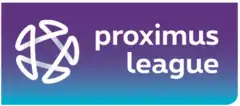Belgian First Division B
The Belgian First Division B (officially known as Proximus League) is the second-highest division in the Belgian football league system, one level below the Belgian First Division A. It was created by the Royal Belgian Football Association in 2016, replacing the Belgian Second Division.
 | |
| Founded | 2016 |
|---|---|
| Country | Belgium |
| Confederation | UEFA |
| Number of teams | 8 |
| Level on pyramid | 2 |
| Promotion to | Belgian First Division A |
| Relegation to | Belgian First Amateur Division |
| Domestic cup(s) | Belgian Cup |
| International cup(s) | UEFA Europa League (via Belgian Cup) |
| Current champions | Beerschot (2019–20) |
| TV partners | Eleven Sports |
| Website | Official website |
| Current: 2020–21 Belgian First Division B | |
History
The Belgian First Division B was created in 2016 as the successor of the Belgian Second Division following an overhaul of the Belgian football league system which saw the number of professional clubs reduced to 24 and the number of teams at the second level of the football pyramid to 8.[1]
During Belgian Second Division era from 1973 to 2016, the second division winner and the play-off winner promote to the first division. From 2016 on, the second division winner is no longer guaranteed promotion. The league is divided in two periods of 15 games. The winners of a period compete each other in a final. If a team wins both periods, no final is played and it automatically rises to the highest level. In 2017, Lierse became champion of the league, but no promotion was allowed because they did not win a period. Antwerp and SV Roeselare played the final.
Competition format
Until 2020
From its inception in 2016 until 2020, the season consisted of two separate competitions in which all 8 teams played each other twice. The winners of both competitions faced each other in a two-legged playoff with the winner crowned champions and promoted to the Belgian First Division A.
For the remaining teams, until 2019, the top three teams (excluding the promoted team), played together with the teams finishing in the positions 7 through 15 of the Belgian First Division A in a playoff for a ticket into the UEFA Europa League. The remaining four teams played a relegation playoff, with the last team relegating into the Belgian First Amateur Division. From 2019, the top six teams all took part in the Europa League playoffs (including the promoted team), with only the bottom two teams playing the relegation playoff in which they play each other five times.
From 2020
The 2020–21 will no longer see two separate competitions, but rather one double round-robin league in which all teams play each other four times. At the end of the season, the top-ranked team will be crowned champions and promote, while the second-placed team will play a two-legged promotion playoff against the 15th-place finisher from the Belgian First Division A. The team finishing in last place will be relegated to the Belgian National Division 1 (renamed from Belgian First Amateur Division).
Past results overview
| Season | Opening tournament winner | Closing tournament winner | Promotion play-off winner | Europa League play-offs qualifiers | Relegated |
|---|---|---|---|---|---|
| 2016–17 | Roeselare | Antwerp | Antwerp | Lierse, Roeselare and Union SG | Lommel United |
| 2017–18 | Beerschot Wilrijk | Cercle Brugge | Cercle Brugge | Beerschot Wilrijk, OH Leuven and Lierse | none [nb 1] |
| 2018–19 | Mechelen | Beerschot Wilrijk | Mechelen | Beerschot Wilrijk, Union SG and Westerlo | Tubize |
| 2019–20 | OH Leuven | Beerschot | Beerschot [nb 2] | not held [nb 3] | Roeselare and Virton [nb 4] |
Footnotes
- Although Tubize finished last and would have been relegated, Lierse went bankrupt and was removed as a team. As a result, Tubize remained in the Belgian First Division B while the matricule of Lierse was removed.
- Both Beerschot and OH Leuven were promoted as the First Division A was expanded to 18 teams.
- Not held due to coronavirus pandemic, Beerschot, Lommel, OH Leuven, Union SG, Virton and Westerlo had qualified.
- No relegation playoffs were played as the coronavirus pandemic, but both Roeselare and Virton were relegated as they were refused a professional football license due to insufficient proof of financial solvency. Lokeren went bankrupt and was removed as a team.
References
- "La réforme du championnat approuvée: une grande lessive se prépare en D2 (INFOGRAPHIE)" (in French). dh.be. 15 June 2015. Retrieved 8 July 2015.